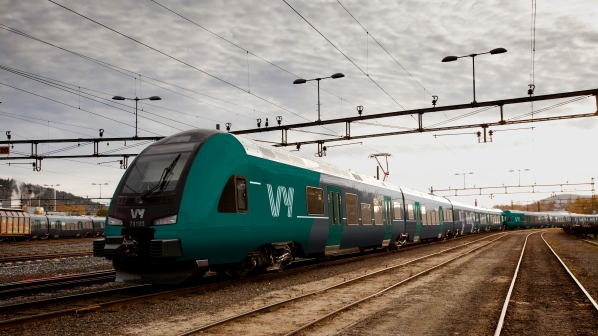NORWAY’s incoming government has announced plans to stop tendering rail services in the country, with the government yet to confirm how these will be operated in future. The government also plans to increase rail’s share of the passenger and freight markets, review the organisational structure of the rail sector and improve the night train offer.
The plans come after a Labour Party-led coalition unseated the Conservative government after eight years in power following an election in September. The plans were unveiled in the “Hurdalsplattformen” policy statement released on October 13 before the new government was sworn in on October 14.
Norway’s Ministry of Transport and Communications first launched a competitive tender to operate passenger services on the national network in February 2016 under plans to liberalise the sector unveiled in 2015.
The Norwegian Railway Directorate announced in October 2018 that it had selected Go-Ahead Norge as the winner of Traffic Package 1, with Swedish national operator SJ winning Traffic Package North in June 2019. Vy Tog (formerly Norwegian State Railways) won Traffic Package 3 in December 2019, beating TideArriva and SJ Norway.
The directorate announced in July 2020 that it was postponing the awarding of Traffic Package 4 to operate passenger services around Oslo by a year, in order to give operators more certainty following the coronavirus pandemic. The competitive tender for operation of Traffic Package 5, which comprises regional and regional express trains from Oslo and Bratsberg Line services, was subsequently postponed by a year in March 2021.
But under the government’s new plans, the tendering of packages 4 and 5 would be scrapped, along with the tendering of track and infrastructure maintenance and operation. The government says it plans to reduce the number of operators in the country, to simplify the system for passengers and increase rail’s competitiveness with other transport modes.
"Vy is operating the services under Package 4 and Package 5 today and will of course be able to operate them in the future, but the government has not yet communicated how the contracts will be awarded," says VY EVP communication and public affairs, Mr Marius Holm. "Vy is operating Package 3 in West Norway after winning the tender and will continue to operate it in accordance with the contract. We assume the operators of packages 1 and 2 are committed to the same."
SJ told IRJ it would be asking the Norwegian Railway Directorate whether the new government policy would affect its contract won in 2019.
"We regret the development announced by the new government," says Mr Dan Olofsson, head of Tendered Services at SJ. "Our experience is that competition gives the state more train for the money and travellers a better product. According to the Fourth Railway Package, which is also being implemented in Norway, traffic will be exposed to competition again sooner or later. A direct awarded contract may only last for a maximum of 10 years. A temporary stop in the market opening will only lead to a pause in the development in Norway. It does not benefit the customers.
"We face strong competition from the Norwegian state owned train company, Vy, in Sweden. It’s not a fair market to give Vy advantages of a 'protected home market' in Norway, without competition from other train operating companies, but at the same time allowing them to compete in other countries like Sweden."
The government also plans to review and simplify the current organisation of the railway sector to create a clear outline of responsibilities between the ministry, railway directorate and infrastructure manager Bane Nor.
"What changes the assessment will lead to, and how they will affect Vy is too early to say, but we are ready to continue our efforts to improve rail services and win new customers in sharp competition with cars and airlines," Holm says.
"The critical factor for success in that competition is investments in rail infrastructure to increase reliability, capacity and speed. We appreciate the new governments ambition to complete the Intercity lines and increase the rail cargo capacity."
Other changes include a reduction in the maintenance backlog and the construction of new passing loops and double-track sections to increase capacity and facilitate the full or partial electrification of the network alongside the use of other technology to reduce emissions.
The government’s plan includes a pledge to improve the night train offer, and the current environmental support scheme for rail freight transport, as well as develop InterCity services in the east. Construction of the Northern Norway line will also be included in the next National Transport Plan.
Bane Nor says it was encouraging to see support for rail included in the plan, including the structural review.
“It is very positive that the government platform explicitly mentions further development, and that they will pursue an offensive railway policy,” says Bane Nor CEO, Mr Gorm Frimannslund. “We interpret this as an intensified investment in train transport.
“It is our experience that there is an unclear division of responsibilities and that the sector is confusing. In addition, there is a need for better coordination in the transport sector in general.”
However, Mr Nick Brooks, the secretary general of the Alliance of Passenger Rail New Entrants in Europe (AllRail), said the plans were more regressive than offensive.
“Competitive tendering of public service offerings has been proven to improve service quality and frequencies while reducing the burden on the taxpayer,” he says. “By contrast, renewed directly awarded PSOs to the state-owned operator are a regressive policy that failed in the past - this will lead to a smaller, more inflexible and inefficient rail market that will not be attractive for the passengers. If Norway plans to be part of a European single rail market, then this is the wrong way to go about it.”

